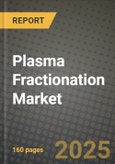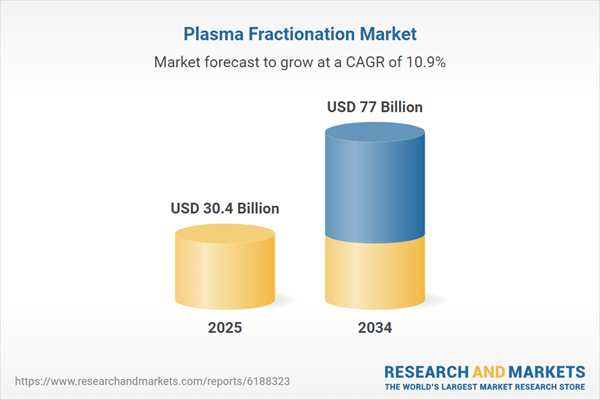Plasma Fractionation Market Overview
The plasma fractionation market is experiencing steady growth, driven by the increasing demand for plasma-derived therapies in treating immune deficiencies, bleeding disorders, and neurological diseases. Plasma fractionation is the process of separating plasma into its component proteins, such as albumin, immunoglobulins, and clotting factors, which are essential for life-saving medical treatments. With the rising prevalence of chronic diseases and rare genetic disorders, healthcare systems worldwide are prioritizing access to plasma-based therapeutics. The growing use of plasma proteins in immunology, hematology, and critical care further fuels market expansion. Additionally, advancements in fractionation techniques, improved blood collection processes, and expanding plasma donation networks are ensuring a stable supply of raw materials for the industry. As regulatory agencies emphasize stringent quality and safety standards, companies are investing in innovative purification and processing technologies to enhance product efficacy and minimize contamination risks.The plasma fractionation market witnessed significant developments, with increased plasma collection efforts and expanding therapeutic applications driving growth. Governments and healthcare organizations worldwide launched initiatives to encourage voluntary plasma donations, addressing supply constraints. The integration of advanced chromatography and filtration technologies improved the efficiency and purity of plasma-derived products, enhancing treatment outcomes. Additionally, biopharmaceutical companies ramped up investments in research and development, leading to the approval of novel plasma-derived therapies targeting rare diseases and autoimmune disorders. Regulatory agencies streamlined approval processes for plasma-based treatments, ensuring faster market entry. Meanwhile, strategic collaborations between plasma collection centers, hospitals, and pharmaceutical firms strengthened global supply chains, mitigating disruptions caused by geopolitical and economic factors. The industry also saw growing interest in alternative sources of therapeutic proteins, such as recombinant biologics, influencing the competitive landscape.
The plasma fractionation market is poised for sustained growth, driven by increasing patient awareness and healthcare access in emerging markets. Companies will continue to focus on optimizing plasma collection and processing efficiency through automation and AI-driven analytics. Innovations in recombinant DNA technology may create competition for plasma-derived therapies, prompting manufacturers to enhance production scalability and cost-effectiveness. Sustainability efforts will gain prominence, with firms exploring eco-friendly plasma fractionation techniques and reducing reliance on single-use plastics in manufacturing. The expansion of personalized medicine and targeted immunotherapies will further drive demand for specialized plasma products. Additionally, regulatory harmonization across regions will facilitate smoother market entry for plasma-derived treatments, ensuring broader patient access. As research continues into novel therapeutic applications, the plasma fractionation industry is expected to play a critical role in the future of precision medicine and advanced biologics.
Key Insights: Plasma Fractionation Market
- Advancements in Plasma Processing Technologies: Innovations in chromatography, filtration, and purification techniques are improving the efficiency and quality of plasma-derived therapies.
- Growth in Plasma Donation Networks: Governments and private organizations are expanding plasma collection centers and launching awareness campaigns to increase voluntary plasma donations.
- Rising Adoption of Recombinant Alternatives: Advances in recombinant biologics are offering synthetic alternatives to plasma-derived therapies, reshaping market dynamics.
- Personalized Medicine and Targeted Therapies: The demand for customized treatments is driving the development of specialized plasma-based therapies for rare and chronic conditions.
- Regulatory Streamlining and Market Access: Global regulatory agencies are harmonizing approval pathways to accelerate the commercialization of plasma-derived treatments.
- Rising Prevalence of Immunodeficiencies and Bleeding Disorders: The growing incidence of hemophilia, primary immunodeficiencies, and neurological disorders is increasing demand for plasma-based treatments.
- Expanding Healthcare Infrastructure in Emerging Markets: Developing regions are investing in plasma fractionation facilities, boosting access to life-saving plasma-derived therapies.
- Technological Innovations in Fractionation Processes: Advances in automation and AI-driven analytics are enhancing plasma processing efficiency and scalability.
- Increased Public and Private Investments: Biopharmaceutical companies and governments are investing in plasma research, collection centers, and novel treatment development.
- Supply Chain Constraints and Plasma Shortages: Plasma collection remains a major bottleneck, with fluctuating donor participation and regulatory restrictions impacting supply stability.
Plasma Fractionation Market Segmentation
By Product
- Immunoglobulins
- Coagulation Factors
- Albumin
- Protease Inhibitors
By Application
- Immunology
- Hematology
- Neurology
- Critical Care
- Hemato-Oncology
- Rheumatology
By End User
- Hospitals and Clinics
- Clinical Research Laboratories
- Academic Institutes
Key Companies Analysed
- Baxter International Inc.
- Bio Products Laboratory Limited
- Biotest AG
- CSL Limited
- Grifols S. A
- ADMA Biologics Inc.
- Green Cross Corporation
- Hualan Bioengineering Inc.
- Intas Pharmaceuticals Ltd.
- Japan Blood Products Organization
- Kedrion S. P. A.
- Kamada Ltd.
- LFB Biomedicaments S. A. S
- Octapharma AG
- ProMetic Life Sciences Inc.
- Sanquin Plasma Products B. V.
- Shanghai Raas Blood Products Co. Ltd.
- Shire PLC
- Takeda Pharmaceutical Company
- Terumo BCT
- Bioverativ Inc.
- China Biologic Products Holdings Inc.
- China National Biotec Group
- Emergent BioSolutions Inc.
- Grifols International S. A.
- Bharat Serum Vaccines Limited
- Plasma Therapeutics
- Prothya Biosolutions B. V.
- BioPharma Plasma LLC
- BioLife Plasma Services LP
Plasma Fractionation Market Analytics
The report employs rigorous tools, including Porter’s Five Forces, value chain mapping, and scenario-based modeling, to assess supply-demand dynamics. Cross-sector influences from parent, derived, and substitute markets are evaluated to identify risks and opportunities. Trade and pricing analytics provide an up-to-date view of international flows, including leading exporters, importers, and regional price trends.Macroeconomic indicators, policy frameworks such as carbon pricing and energy security strategies, and evolving consumer behavior are considered in forecasting scenarios. Recent deal flows, partnerships, and technology innovations are incorporated to assess their impact on future market performance.
Plasma Fractionation Market Competitive Intelligence
The competitive landscape is mapped through proprietary frameworks, profiling leading companies with details on business models, product portfolios, financial performance, and strategic initiatives. Key developments such as mergers & acquisitions, technology collaborations, investment inflows, and regional expansions are analyzed for their competitive impact. The report also identifies emerging players and innovative startups contributing to market disruption.Regional insights highlight the most promising investment destinations, regulatory landscapes, and evolving partnerships across energy and industrial corridors.
Countries Covered
- North America - Plasma Fractionation market data and outlook to 2034
- United States
- Canada
- Mexico
- Europe - Plasma Fractionation market data and outlook to 2034
- Germany
- United Kingdom
- France
- Italy
- Spain
- BeNeLux
- Russia
- Sweden
- Asia-Pacific - Plasma Fractionation market data and outlook to 2034
- China
- Japan
- India
- South Korea
- Australia
- Indonesia
- Malaysia
- Vietnam
- Middle East and Africa - Plasma Fractionation market data and outlook to 2034
- Saudi Arabia
- South Africa
- Iran
- UAE
- Egypt
- South and Central America - Plasma Fractionation market data and outlook to 2034
- Brazil
- Argentina
- Chile
- Peru
Research Methodology
This study combines primary inputs from industry experts across the Plasma Fractionation value chain with secondary data from associations, government publications, trade databases, and company disclosures. Proprietary modeling techniques, including data triangulation, statistical correlation, and scenario planning, are applied to deliver reliable market sizing and forecasting.Key Questions Addressed
- What is the current and forecast market size of the Plasma Fractionation industry at global, regional, and country levels?
- Which types, applications, and technologies present the highest growth potential?
- How are supply chains adapting to geopolitical and economic shocks?
- What role do policy frameworks, trade flows, and sustainability targets play in shaping demand?
- Who are the leading players, and how are their strategies evolving in the face of global uncertainty?
- Which regional “hotspots” and customer segments will outpace the market, and what go-to-market and partnership models best support entry and expansion?
- Where are the most investable opportunities - across technology roadmaps, sustainability-linked innovation, and M&A - and what is the best segment to invest over the next 3-5 years?
Your Key Takeaways from the Plasma Fractionation Market Report
- Global Plasma Fractionation market size and growth projections (CAGR), 2024-2034
- Impact of Russia-Ukraine, Israel-Palestine, and Hamas conflicts on Plasma Fractionation trade, costs, and supply chains
- Plasma Fractionation market size, share, and outlook across 5 regions and 27 countries, 2023-2034
- Plasma Fractionation market size, CAGR, and market share of key products, applications, and end-user verticals, 2023-2034
- Short- and long-term Plasma Fractionation market trends, drivers, restraints, and opportunities
- Porter’s Five Forces analysis, technological developments, and Plasma Fractionation supply chain analysis
- Plasma Fractionation trade analysis, Plasma Fractionation market price analysis, and Plasma Fractionation supply/demand dynamics
- Profiles of 5 leading companies - overview, key strategies, financials, and products
- Latest Plasma Fractionation market news and developments
Additional Support
With the purchase of this report, you will receive:- An updated PDF report and an MS Excel data workbook containing all market tables and figures for easy analysis.
- 7-day post-sale analyst support for clarifications and in-scope supplementary data, ensuring the deliverable aligns precisely with your requirements.
- Complimentary report update to incorporate the latest available data and the impact of recent market developments.
This product will be delivered within 1-3 business days.
Table of Contents
Companies Mentioned
- Baxter International Inc.
- Bio Products Laboratory Limited
- Biotest AG
- CSL Limited
- Grifols S. A
- ADMA Biologics Inc.
- Green Cross Corporation
- Hualan Bioengineering Inc.
- Intas Pharmaceuticals Ltd.
- Japan Blood Products Organization
- Kedrion S. P. A.
- Kamada Ltd.
- LFB Biomedicaments S. A. S
- Octapharma AG
- ProMetic Life Sciences Inc.
- Sanquin Plasma Products B. V.
- Shanghai Raas Blood Products Co. Ltd.
- Shire PLC
- Takeda Pharmaceutical Company
- Terumo BCT
- Bioverativ Inc.
- China Biologic Products Holdings Inc.
- China National Biotec Group
- Emergent BioSolutions Inc.
- Grifols International S. A.
- Bharat Serum Vaccines Limited
- Plasma Therapeutics
- Prothya Biosolutions B. V.
- BioPharma Plasma LLC
- BioLife Plasma Services LP
Table Information
| Report Attribute | Details |
|---|---|
| No. of Pages | 160 |
| Published | October 2025 |
| Forecast Period | 2025 - 2034 |
| Estimated Market Value ( USD | $ 30.4 Billion |
| Forecasted Market Value ( USD | $ 77 Billion |
| Compound Annual Growth Rate | 10.8% |
| Regions Covered | Global |
| No. of Companies Mentioned | 30 |









